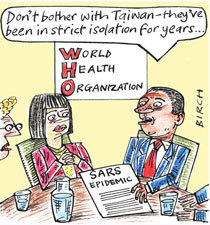Tokyo
Researchers in Taiwan say they are being shut out of the global investigation into the pneumonia-like disease that is sweeping the world because their country isn't recognized by the World Health Organization (WHO), which is coordinating the study.
Mei-Shang Ho, an epidemiologist at Taiwan's Academia Sinica, is one of several researchers who say they have been denied access to samples and information. Ho wanted more data on severe acute respiratory syndrome (SARS) after it affected two Taiwanese patients in early March. But WHO officials told Ho and other investigators that they should instead approach the People's Republic of China in Beijing, which the organization does recognize.
“Knowing the information is there but not being able to get it is truly frustrating,” says Ho, who decided to travel to Beijing last week to get first-hand data on the disease's spread. “We can't get any information from the WHO,” says Yuan-Tsong Chen, director of the Institute of Biomedical Sciences at the Academia Sinica in Taipei.
China has never recognized the government of Taiwan, where Chinese nationalists retreated when the communists won control of the mainland in 1949. It considers Taiwan to be its province, and since 1972, when the United Nations admitted the communist government in Beijing, the WHO and other bodies have denied Taiwan membership.
Unable to participate in meetings between the WHO's collaborating centres, Taiwan's researchers must rely on the WHO's website. “By the time the information is in the public domain, it's probably out of date,” says Chen. WHO officials are keen to visit mainland China, but have not asked to visit Taiwan.
Taiwanese researchers say they have also struggled to obtain materials such as diagnostic reagents. To test Taiwan's 23 probable SARS cases for the coronavirus thought to be responsible, researchers wanted to use antibody tests distributed by the WHO. “We were told to go to Beijing,” says Chien-Jen Chen, an epidemiologist at National Taiwan University and chair of the island's SARS advisory committee.
The WHO says its hands are tied because Taiwan is not a member. Iain Simpson, a WHO spokesman in Geneva, says that the organization arranged for Taiwan to receive a visitor from the Centers for Disease Control and Prevention in Atlanta, Georgia, one of its collaborating centres. “There's little more that we can do,” he adds.
Government officials are highlighting the situation to promote Taiwan's case for full representation at the United Nations and the WHO. “We share our public-health officials' anger that for political reasons we are denied access to the world health system,” said Parris Chang, a legislator with Taiwan's ruling Democratic Progressive Party, on a visit to Washington DC last week. He added that Taiwan is demanding observer status at the World Health Assembly, the WHO's governing body.
Congressman Sherrod Brown (Democrat, Ohio) backed Chang and called for the United States to support the recognition of Taiwan more vigorously. Taiwan's current plight is an “unjustified violation of the basic human right to healthcare”, says Brown.
Despite its isolation, Taiwan seems to be dealing successfully with the epidemic. Since mid-March, when the first cases were recognized, it has reported one new case a day, compared with five each day in Singapore and 40 in Hong Kong. There have been no deaths.
Taiwanese researchers have also enjoyed some collaborative success. A Taiwanese group was involved in a study that isolated the coronavirus from patients in Taiwan and elsewhere (T. G. Ksiazek et al. N. Engl. J. Med. doi:10.1056/NEJMoa030781; 2003).
●Researchers at Canada's Michael Smith Genome Sciences Centre in Vancouver, British Columbia, said on 12 April that they have sequenced the coronavirus that is thought to cause SARS (http://www.bcgsc.bc.ca).


